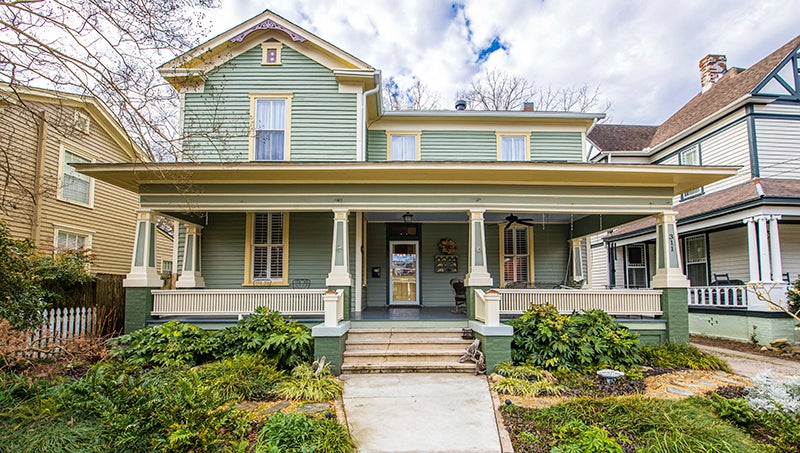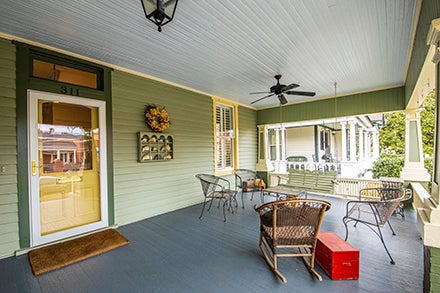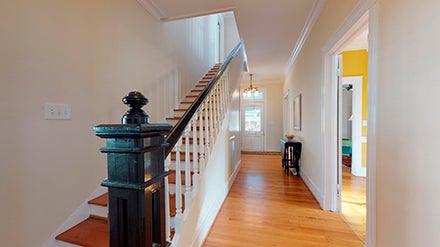Realtors relying on virtual tours to keep showing homes
Published 8:38 am Saturday, April 25, 2020

- VIRTUALLY AVAILABLE: A virtual tour of 311 E. Main St. in Washington is available for those in the market for house shopping, but are not currently in the market for house touring in person. Virtual tours have been trending in real estate marketing in recent years, more so now than ever. The virtual tour of this home can be found at my.matterport.com/show/?m=rvjovpDvdg6&brand=0&ts=1. (Lighthouse Visuals)
|
Getting your Trinity Audio player ready...
|
When you open the door of this house, no key is necessary. Directions to the property, an appointment and a meeting with a real estate agent at a designated time isn’t needed either. It’s an open house every hour of the day, every day of the week, for anyone, anywhere.
All that’s required is a little bit of technology.
Virtual tours of home listings made an appearance several years ago, but it’s only been in the past month their value has truly been made known. When the stay-at-home order issued to stop the spread of COVID-19 put home showings and open houses across the state on the backburner for Realtors, those in the market for a new home didn’t stop looking, they simply started looking a lot more at those listings featuring virtual tours.

INSIDE OUT: Virtual tours provide a more detailed view of a home than photographs and allow users to explore spaces at their own leisure. (Lighthouse Visuals)
“It’s an easy tool to use. It keeps the thought of a real estate purchase or sale more at the top of the mind. It’s a good tool to play around with while you’re at home. If you’re thinking of buying or selling, it keeps a person engaged,” said Scott Campbell, a Realtor with Century 21 The Realty Group in Washington.
It’s become especially convenient over the past month, according to Will Preslar, owner of Lighthouse Visuals. Preslar, a Washington native, said the virtual tours his company provides have never been more in demand. On the day the stay-at-home was issued in the state of North Carolina, Preslar contacted the N.C. Department of Revenue to request Lighthouse Visuals be considered an essential business, able to operate under the order. Less than 24 hours later, he was given the go-ahead.
“People still have houses on the market and still need to show houses. (Virtual tours) have proven their worth and now are considered a necessity, and I truly believe that, post-COVID, they will continue to be a necessity,” Preslar said.

FLYING HIGH: In addition to much-in-demand virtual tours, Lighthouse Visuals also offers aerial photography for real-estate listings.
In the month of April, Preslar said Lighthouse Visuals photographers have created virtual tours for more than 500 houses, from Charlotte to the coast. Business has doubled, he said, and every day, his office is fielding inquiries from potential new clients. Preslar said it’s the marketing that sells a home, and while looking at photographs online can pique a buyer’s interest, it doesn’t compare to being able to walk through a listing, even virtually — through every nook and cranny, from living rooms and bedrooms to views from stair landings and details viewers can zoom in on.
“Great imagery excites the buyer, but a virtual tour can really solidify the piece for a homeowner and agent,” Preslar said. “They’re not a video. You don’t have to hit play and pause to look at a room. With our virtual tour technology, you’re able to fully immerse yourself in a home and guide yourself through a home at your leisure. … We have agents, especially in the Raleigh market, who have used our virtual tours and sold their homes sight-unseen within days.”
Preslar said many of his clients have been using virtual tours in a completely different way since the stay-at-home order went into effect. Some have been creating virtual tour events on Facebook and hosting the tours for potential buyers; others have been meeting with clients remotely through Zoom and sharing screens to “walk” clients through the property.

DETAILS MATTER: Being able to zoom in on details is one of the benefits of virtual tours that traditional photography cannot provide.
“The shareability of the virtual tours is incredible — just to be able to tie that in to Zoom,” Preslar said.
The demand is growing: Preslar said his company was recently selected as a preferred scan service provider by leading spatial data company Matterport — meaning Lighthouse Visuals will be creating many more virtual tours as one of the preferred providers in the state. He doesn’t see the workload diminishing anytime soon.
“It keeps the housing market rolling,” Preslar said. “I haven’t seen a slowdown in the number of houses that have been listed on our end.”

360 DEGREES: From this spot in the kitchen of 311 E. Main St., a viewer can “turn” to the left to inspect the refrigerator, “turn” to the right to take a look at the gas range and “turn around” to look down the central entrance hall.
While the real estate market doesn’t appear to have slowed down because of COVID-19, it is becoming more technologically driven.
“(Virtual tours are) probably going to be used more and more, regardless of the current situation, in that they can help weed out — in a tight market — they can help a buyer weed out which houses, which layouts, won’t work for them,” Campbell said. “It’s a good tool for being more efficient as a buyer and as an agent.”

WALKTHROUGH FROM AFAR: The virtual tour allows users to “walk through” this room to have a look at the adjoining bathroom, then turn around and “walk” back to explore other parts of the house.





